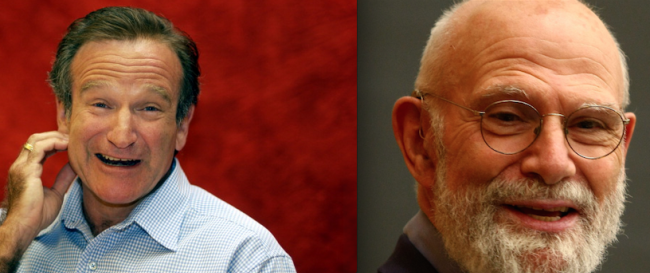
Readers of Thursday’s New York Times were treated to an op-ed by frequent contributor Oliver Sacks, the world-famous neurologist and writer. However, instead of his typical opinion pieces and book excerpts detailing the fascinating world of neurology and human behavior, the author wrote about himself. Specifically, Sacks revealed that he has terminal cancer and limited time left to live:
I feel grateful that I have been granted nine years of good health and productivity since the original diagnosis, but now I am face to face with dying. The cancer occupies a third of my liver, and though its advance may be slowed, this particular sort of cancer cannot be halted.
True to character, Sacks spent most of an otherwise dour article highlighting the brilliance of his life. However, Sacks failed to mention his friendship with the late Robin Williams, which was a significant one.
The actor and the scientist first came together in 1989, when Williams and Robert De Niro were set to play the two lead roles in the film adaptation of Sacks’s book, Awakenings. Neither knew what kind of impact they would have on each others’ lives then, but decades later, the subject of their friendship would live on in interviews, articles, and stand-up sketches.
Almost a year before Williams’s death, the adored comedian did a Reddit AMA to promote his CBS sitcom The Crazy Ones. When a Redditor asked Williams what his favorite film role was, he answered without hesitation:
I think playing Oliver Sacks in Awakenings was a gift because I got to meet him, and got to explore the human brain from the inside out. Because Oliver writes about human behavior subjectively and that for me was the beginning of a fascination with human behavior.
Williams’s answer simply describes the circumstances of his initial meeting with Sacks. But when another user asked about what it was like to work with De Niro, Williams applauded the actor’s dedication with — of course — a supposedly true story about a gag Sacks concocted on set:
He is SO good, and such a method actor, that Oliver Sacks wanted to hook him up to an EEG to see if he actually duplicated the brainwaves of the actual patients. No joke.
The story alluded to here bears all the hallmarks of a stand-up routine, but something’s missing. Perhaps Sacks truly wanted to test De Niro’s acting abilities scientifically, but what if Williams put him up to it? Such a gag would surely help water the seeds of a rowdy camaraderie.
Being the intensely private man that he was, Sacks mostly kept to himself whenever non-scientific subjects came into the foreground. Williams was never shy about flaunting his newfound intellectual friend, and he would often applaud Sacks’s brilliant and gentle character during interviews.
While promoting the film on The Tonight Show Starring Johnny Carson, the host asked Williams whether or not he’d ever met the man his character was based on. Williams answered affirmatively, but whenever he spoke about Sacks specifically, much of his comedy became geniality:
He’s wonderful! He was there everyday. He’s an amazing man. He’s about 6-foot-4. He’s like a combination of Arnold Schwarzenegger and Albert Schweitzer, and he also looks like Santa Claus because he’s got this big beard. Usually, there’s food in it that he’s forgotten. “Oh, oh, oh good. I forgot that.”
Long after Awakenings, Sacks and Williams maintained a strong and friendly bond, especially when it came to science. While promoting his book Musicophilia in 2008, Sacks spoke briefly about their friendship in an interview with the National Review of Medicine:
We have long aquatic dialogues. I do backstroke, he kayaks, and we talk for hours on the water. He’s a dear friend — entirely different one-on-one than the eruptive persona that people know.
That anyone could fascinate Williams long enough to dampen his otherwise improvisational public persona is mind-blowing, yet Sacks was able to do it, and whether this effect on Williams was largely due to the man himself or the intellectual subjects he specialized is unknown. Either way, it worked. In all of the interview clips provided here, Williams actually slows down whenever he talks about Sacks.
After the investigation into Williams’s death revealed it was a suicide, Sacks wrote a kind response to the news for the New Yorker. In it, he expanded on his and the actor’s “long, aquatic dialogues.”
I sometimes joined the Williamses in the summer at Lake Tahoe. I would go for long swims in the lake, with Robin paddling next to me in a kayak. We would chat about neurology and biology, literature, history, biographies—he was startlingly well informed on pretty much everything under the sun, and this was a very different Robin—thoughtful, relaxed, not onstage, not “on.”
In addition to all his gifts, Robin was the kindest and most generous of men. William James, the great nineteenth-century psychologist, was called “that adorable genius.” For me, more than anyone I have ever known, Robin, too, was that adorable genius. It is infinitely sad that this unique human being, who gave so much and so fully of himself to all of us, should have taken his own life.
At the same time, Williams could be the same man everyone in the world had come to love, the jester who could make anyone laugh. By all indications, he made Sacks laugh many, many times, and Sacks granted the comedian access to a fantastic world of scientific knowledge and intellectual splendor, a world with which the actor become utterly enamored.






